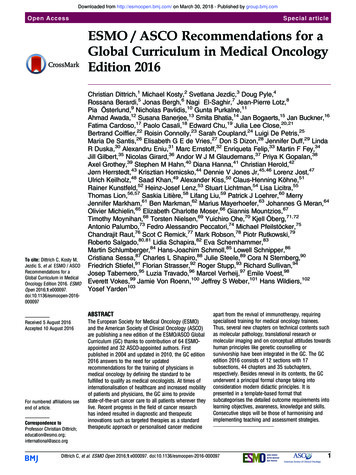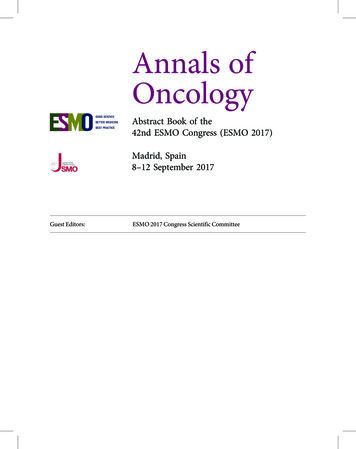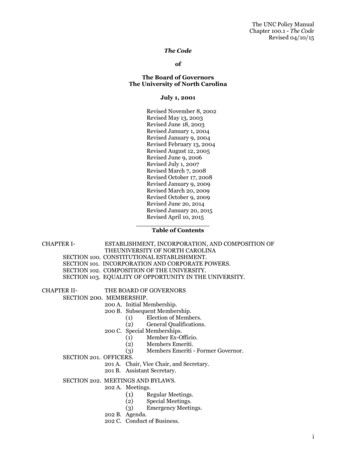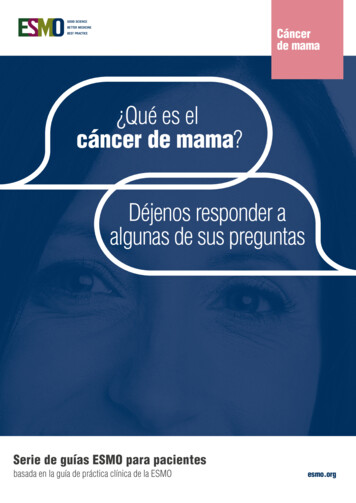
Transcription
Downloaded from http://esmoopen.bmj.com/ on March 30, 2018 - Published by group.bmj.comOpen AccessSpecial articleESMO / ASCO Recommendations for aGlobal Curriculum in Medical OncologyEdition 2016To cite: Dittrich C, Kosty M,Jezdic S, et al. ESMO / ASCORecommendations for aGlobal Curriculum in MedicalOncology Edition 2016. ESMOOpen stian Dittrich,1 Michael Kosty,2 Svetlana Jezdic,3 Doug Pyle,4Rossana Berardi,5 Jonas Bergh,6 Nagi El-Saghir,7 Jean-Pierre Lotz,8Pia Österlund,9 Nicholas Pavlidis,10 Gunta Purkalne,11Ahmad Awada,12 Susana Banerjee,13 Smita Bhatia,14 Jan Bogaerts,15 Jan Buckner,16Fatima Cardoso,17 Paolo Casali,18 Edward Chu,19 Julia Lee Close,20,21Bertrand Coiffier,22 Roisin Connolly,23 Sarah Coupland,24 Luigi De Petris,25Maria De Santis,26 Elisabeth G E de Vries,27 Don S Dizon,28 Jennifer Duff,29 LindaR Duska,30 Alexandru Eniu,31 Marc Ernstoff,32 Enriqueta Felip,33 Martin F Fey,34Jill Gilbert,35 Nicolas Girard,36 Andor W J M Glaudemans,37 Priya K Gopalan,38Axel Grothey,39 Stephen M Hahn,40 Diana Hanna,41 Christian Herold,42Jørn Herrstedt,43 Krisztian Homicsko,44 Dennie V Jones Jr,45,46 Lorenz Jost,47Ulrich Keilholz,48 Saad Khan,49 Alexander Kiss,50 Claus-Henning Köhne,51Rainer Kunstfeld,52 Heinz-Josef Lenz,53 Stuart Lichtman,54 Lisa Licitra,55Thomas Lion,56,57 Saskia Litière,58 Lifang Liu,59 Patrick J Loehrer,60 MerryJennifer Markham,61 Ben Markman,62 Marius Mayerhoefer,63 Johannes G Meran,64Olivier Michielin,65 Elizabeth Charlotte Moser,66 Giannis Mountzios,67Timothy Moynihan,68 Torsten Nielsen,69 Yuichiro Ohe,70 Kjell Öberg,71,72Antonio Palumbo,73 Fedro Alessandro Peccatori,74 Michael Pfeilstöcker,75Chandrajit Raut,76 Scot C Remick,77 Mark Robson,78 Piotr Rutkowski,79Roberto Salgado,80,81 Lidia Schapira,82 Eva Schernhammer,83Martin Schlumberger,84 Hans-Joachim Schmoll,85 Lowell Schnipper,86Cristiana Sessa,87 Charles L Shapiro,88 Julie Steele,89 Cora N Sternberg,90Friedrich Stiefel,91 Florian Strasser,92 Roger Stupp,93 Richard Sullivan,94Josep Tabernero,95 Luzia Travado,96 Marcel Verheij,97 Emile Voest,98Everett Vokes,99 Jamie Von Roenn,100 Jeffrey S Weber,101 Hans Wildiers,102Yosef Yarden103ABSTRACTReceived 5 August 2016Accepted 10 August 2016For numbered affiliations seeend of article.Correspondence toProfessor Christian The European Society for Medical Oncology (ESMO)and the American Society of Clinical Oncology (ASCO)are publishing a new edition of the ESMO/ASCO GlobalCurriculum (GC) thanks to contribution of 64 ESMOappointed and 32 ASCO-appointed authors. Firstpublished in 2004 and updated in 2010, the GC edition2016 answers to the need for updatedrecommendations for the training of physicians inmedical oncology by defining the standard to befulfilled to qualify as medical oncologists. At times ofinternationalisation of healthcare and increased mobilityof patients and physicians, the GC aims to providestate-of-the-art cancer care to all patients wherever theylive. Recent progress in the field of cancer researchhas indeed resulted in diagnostic and therapeuticinnovations such as targeted therapies as a standardtherapeutic approach or personalised cancer medicineapart from the revival of immunotherapy, requiringspecialised training for medical oncology trainees.Thus, several new chapters on technical contents suchas molecular pathology, translational research ormolecular imaging and on conceptual attitudes towardshuman principles like genetic counselling orsurvivorship have been integrated in the GC. The GCedition 2016 consists of 12 sections with 17subsections, 44 chapters and 35 subchapters,respectively. Besides renewal in its contents, the GCunderwent a principal formal change taking intoconsideration modern didactic principles. It ispresented in a template-based format thatsubcategorises the detailed outcome requirements intolearning objectives, awareness, knowledge and skills.Consecutive steps will be those of harmonising andimplementing teaching and assessment strategies.Dittrich C, et al. ESMO Open 2016;1:e000097. doi:10.1136/esmoopen-2016-0000971
Downloaded from http://esmoopen.bmj.com/ on March 30, 2018 - Published by group.bmj.comOpen AccessESMO/ASCO GLOBAL CURRICULUM WORKING GROUPChairChristian Dittrich, MD, Professor of MedicineHead of 3rd Medical Department—Centre for Oncology and Haematology, Kaiser Franz Josef-Spital, Vienna, AustriaMembersEmilio Alba Conejo, MDDirector of UGCI Oncology Intercentros, Hospital Universitario Virgen de la Victoria y Regional de Malaga, Malaga,SpainRossana Berardi, MD, Professor of Medical OncologyHead of Department of Medical Oncology, Università Politecnica delle Marche, Ospedali Riuniti Ancona, Ancona, ItalyJonas Bergh, MD, PhD, FRCP (London, UK), Professor of Oncology (Mimi Althainz’ donation)Director, The Strategic Research Programme in Cancer, Karolinska Institutet and University Hospital, Stockholm, SwedenNagi El-Saghir, MD, FACP, Professor of Clinical MedicineDepartment of Internal Medicine, NK Basile Cancer Institute, American University of Beirut Medical Center, Beirut,LebanonJacek Jassem, MD, PhD, Professor of Clinical Oncology and RadiotherapyHead of the Department of Oncology and Radiotherapy, Medical University of Gdansk, Gdansk, PolandMichael Kosty, MD, FACP, FASCODirector, Scripps Green Cancer Center, Division of Hematology/Oncology, Scripps Clinic, La Jolla, California, USARoberto Ivan Lopez, MDCentro Oncologico Punta Pacifica, Medical Oncology, Panama, PanamaJean-Pierre Lotz, MD, ProfessorHead of the Department of Medical Oncology and Cellular Therapy, Medical Oncology Department, TenonAssistance Publique—Hôpitaux de Paris, Paris, FrancePia Österlund, MD, PhD, DocentDepartment of Oncology, HUCH Helsinki University Central Hospital, Helsinki, Finland and Clinicum, University ofHelsinki, Helsinki, FinlandNicholas Pavlidis, MD, PhD, FRCP Edin(Hon), Professor of Medical OncologyHead of the Department of Medical Oncology, Ioannina University Hospital, Ioannina, GreeceGunta Purkalne, MD, Associate ProfessorClinic of Oncology, Pauls Stradins Clinical University Hospital, Riga, LatviaEDITORIAL BOARDJonas Bergh, MD, PhD, FRCP (London, UK), Professor of Oncology (Mimi Althainz’ donation)Director, The Strategic Research Programme in Cancer, Karolinska Institutet and University Hospital, Stockholm,SwedenHetty Carraway, MD, Associate ProfessorDirector of Hematology/Oncology Fellowship Program, Physician, Department of Hematology Oncology, ClevelandClinic, Cleveland, Ohio, USAJulia Lee Close, MD, FACP, Assistant ProfessorUF Department of Medicine Division of Hematology/Oncology; Director, UF Hematology/Oncology FellowshipProgram; Assistant Chief, Medical Service, Malcom Randall VA Medical Center, Gainesville, Florida, USAChristian Dittrich, MD, Professor of MedicineHead of 3rd Medical Department—Centre for Oncology and Haematology, Kaiser Franz Josef-Spital, Vienna, AustriaJill Gilbert, MD, Associate Professor of MedicineVanderbilt University School of Medicine, Nashville, Tennessee, USAMichael Kosty, MD, FACP, FASCODirector, Scripps Green Cancer Center, Division of Hematology/Oncology, Scripps Clinic, La Jolla, California, USAGunta Purkalne, MD, Associate ProfessorClinic of Oncology, Pauls Stradins Clinical University Hospital, Riga, LatviaEx Officio:Svetlana Jezdic, MD, MScStaff Medical Oncologist, Medical Affairs, European Society for Medical Oncology (ESMO), Lugano, SwitzerlandDoug Pyle, MBAVice President, International Affairs, American Society of Clinical Oncology (ASCO), Alexandria, Virginia, USA2Dittrich C, et al. ESMO Open 2016;1:e000097. doi:10.1136/esmoopen-2016-000097
Downloaded from http://esmoopen.bmj.com/ on March 30, 2018 - Published by group.bmj.comOpen AccessREVIEW BOARDCarsten Bokemeyer, MD, PhD, Professor of MedicineDirector of the Department, Oncology, Hematology and BMT with Section Pneumology, University Medical Centre,Universitaetsklinik Hamburg, Hamburg, GermanyAndrés Cervantes, MD, PhD, Professor of MedicineHead of Department, Medical Oncology Department, Biomedical Research Institute INCLIVA, University of Valencia,Valencia, SpainJulia Lee Close, MD, FACP, Assistant ProfessorUF Department of Medicine Division of Hematology/Oncology; Director, UF Hematology/Oncology FellowshipProgram; Assistant Chief, Medical Service, Malcom Randall VA Medical Center, Gainesville, Florida, USAChristian Dittrich, MD, Professor of MedicineHead of 3rd Medical Department—Centre for Oncology and Haematology, Kaiser Franz Josef-Spital, Vienna, AustriaNagi El-Saghir, MD, FACP, Professor of Clinical MedicineDepartment of Internal Medicine, NK Basile Cancer Institute, American University of Beirut Medical Center, Beirut,LebanonJill Gilbert, MD, Associate Professor of MedicineVanderbilt University School of Medicine, Nashville, Tennessee, USAMichael Kosty, MD, FACP, FASCODirector, Scripps Green Cancer Center, Division of Hematology/Oncology, Scripps Clinic, La Jolla, California, USAYuichiro Ohe, MD, PhDDeputy Director of the Hospital, Chief, Department of Thoracic Oncology, National Cancer Center Hospital, Tokyo,JapanMiklos Pless, MD, ProfessorHead of Medical Oncology, Kantonsspital Winterthur, Winterthur, SwitzerlandDittrich C, et al. ESMO Open 2016;1:e000097. doi:10.1136/esmoopen-2016-0000973
Downloaded from http://esmoopen.bmj.com/ on March 30, 2018 - Published by group.bmj.comOpen AccessTABLE OF CONTENTS41. INTRODUCTION62. STANDARD REQUIREMENTS FOR TRAINING IN MEDICAL ONCOLOGY73. SPECIAL REQUIREMENTS3.1 Programme Leader/Director of Medical Oncology Training Programme773.2. Faculty3.2.1 Faculty members3.2.2 Faculty standards8883.3 Educational Programme3.3.1 Educational environment3.3.2 Professionalism3.3.3 Responsibility3.3.4 Update of skills and knowledge3.3.5 Perception of other specialties3.3.6 Institutional requirements3.3.6.a Clinical setting3.3.6.b Hospital facilities3.3.7 Facilities88888888894. COMPETENCIES REQUIRED IN THE CURRICULUM4.1 Basic Scientific Principles4.1.1 Cancer biology4.1.2 Tumour immunology4.1.3 Aetiology, epidemiology, screening and prevention4.1.4 Clinical research4.1.5 Statistics999101112134.2 Basic Principles in the Management and Treatment of Malignant Diseases4.2.1 Pathology4.2.2 Molecular pathology4.2.3 Laboratory medicine4.2.4 Translational research4.2.5 Principles of personalised cancer medicine4.2.6 Staging procedures (clinical staging)4.2.7 Imaging4.2.8 Molecular imaging4.2.9 RECIST141415171819202122224.3 Therapy4.3.1 Surgical oncology4.3.2 Radiation oncology4.3.3 Anticancer agents4.3.4 Biological therapy4.3.5 Immunotherapy4.3.6 Complications/Toxicities of treatment232324252627284.4 Supportive and Palliative Care4.4.1 Supportive measures4.4.2 Palliative care4.4.3 End-of-life care292933344.5 Management and Treatment of Specific Cancers4.5.1 Head and neck cancers35374.5.2 Thoracic malignancies4.5.2.a Small-cell lung cancer4.5.2.b Non-small-cell lung cancer4.5.2.c Mesothelioma4.5.2.d Thymoma and thymic cancer38383940404.5.3 Gastrointestinal cancers4.5.3.a Oesophageal cancer4.5.3.b Gastric cancer4.5.3.c Colon and rectal cancer4.5.3.d Anal cancer4.5.3.e Hepatobiliary cancers4.5.3.f Pancreatic adenocarcinoma414142444546474.5.4 Genitourinary cancers4.5.4.a Renal cell cancer4848Dittrich C, et al. ESMO Open 2016;1:e000097. doi:10.1136/esmoopen-2016-000097
Downloaded from http://esmoopen.bmj.com/ on March 30, 2018 - Published by group.bmj.comOpen Access4.5.4.b Urothelial cancer4.5.4.c Penile cancer4.5.4.d Prostate cancer4.5.4.e Germ cell tumours495152534.5.5 Gynaecological malignancies4.5.5.a Ovarian cancer (including Fallopian tube and primary peritoneal cancer)4.5.5.b Endometrial cancer4.5.5.c Cervical cancer4.5.5.d Vulvar and vaginal cancers4.5.5.e Gestational trophoblastic neoplasia5555565758594.5.6 Breast cancer594.5.7 Sarcomas4.5.7.a Bone sarcomas4.5.7.b Soft tissue sarcomas4.5.7.c Gastrointestinal stromal tumour616162634.5.8 Skin cancers4.5.8.a Melanoma4.5.8.b Basal cell and squamous cell cancers of the skin6363654.5.9 Endocrine tumours4.5.9.a Thyroid cancer4.5.9.b Neuroendocrine neoplasms6666664.5.10 Central nervous system malignancies674.5.11 Carcinoma of unknown primary site694.5.12 Haematological malignancies4.5.12.a Leukaemias (including acute and chronic leukaemias of lymphoid and myeloid lineage)4.5.12.b Lymphomas4.5.12.b.1 Hodgkin’s lymphoma4.5.12.b.2 Non-Hodgkin’s lymphoma4.5.12.c Plasma cell dyscrasias4.5.12.d Myeloproliferative neoplasms707071717273744.6 Rare Cancers754.7 AIDS-Associated Malignancies764.8 Special Issues in the Diagnosis and Treatment of Cancers in Adolescents774.9 Special Issues in the Diagnosis and Treatment of Cancers in Young Adults784.10 Cancer and Pregnancy794.11 Geriatric Oncology804.12 Cancer Treatment in Patients with Comorbidities815. PSYCHOSOCIAL ASPECTS OF CANCER826. COMMUNICATION847. GENETIC COUNSELLING858. PATIENT EDUCATION859. SURVIVORSHIP8610. BIOETHICAL, LEGAL AND ECONOMIC ISSUES10.1 Bioethical and Legal Issues10.2 Economic Issues of New Cancer Drugs88888911. CANCER CARE DELIVERY IN LOW RESOURCE ENVIRONMENTS9012. SKILLS90Dittrich C, et al. ESMO Open 2016;1:e000097. doi:10.1136/esmoopen-2016-0000975
Downloaded from http://esmoopen.bmj.com/ on March 30, 2018 - Published by group.bmj.comOpen Access1 INTRODUCTIONChristian DittrichMichael KostyWith the increasing internationalisation of healthcareas well as the increased exchange of specialists andknowledge across borders, the European Society forMedical Oncology (ESMO) and the American Society ofClinical Oncology (ASCO) identified more than adecade ago the need for a set of international recommendations for the clinical training of physicians toqualify them as medical oncologist. Patients, whereverthey live, should have an equal chance of receivingstate-of-the-art treatment from well-trained physicians.In 2004, a joint ESMO/ASCO Task Force producedthe first outline for a Global Core Curriculum (GCC)for training in medical oncology. This outline was subsequently distributed to universities as well as medicaloncology societies and was simultaneously published inthe Annals of Oncology and the Journal of ClinicalOncology.1 2 The Global Curriculum (GC) Task Forcealso produced a Log Book as a support tool for medicaloncologists in training and their supervisors with thepurpose of keeping a record of oncology trainees’ educational programmes and their progress.3 4Interest in using the GCC outline has increasedconsiderably since its inception, as evidenced by translations in different languages available on the ESMO andASCO websites.5 6 It is also used as a model for the development of the specialty of medical oncology in severalcountries around the world. The GCC was updated in2010.7 8 The corresponding Log Book was updated in2016 by the Global Curriculum Working Group (GCWG) which evolved from the GC Task Force.9 10In 2011, the European Commission based its formalrecognition of medical oncology as a medical specialtyon the recommendations of the ESMO/ASCO GC.11The Curriculum 2010 covered a broad range ofrecommendations to be adopted by national educationaland health authorities and to be implemented according to the resources and conditions of their countries.Furthermore, it was perceived that the diversity of healthand educational systems around the world may have rendered some curriculum recommendations aspirationalat the stage of its implementation, even for those systemswith well-developed training programmes in medicaloncology. Reflecting this aspirational nature of therecommendations, the former GC Task Force hadchanged the updated Curriculum title from ‘GlobalCore Curriculum’ to ‘Global Curriculum’.An analysis of the ESMO GC European Landscapedata still identified a high degree of heterogeneity,mainly at the organisational level as well as in the duration and structure of the internal medicine part of thetraining in medical oncology in Europe.12 This heterogeneity relates to whether or not medical oncology isrecognised as separate specialty in each country and tothe degree of adoption, adaptation and applicability of6the GC recommendations by the different countries inEurope. Despite the unequivocal progress towards theestablishment of medical oncology and the harmonisation of its implementation in Europe and beyond, thiseffort has to be pursued further.Important advances in medical oncology have beenachieved in recent years, notably in the integration ofmolecular pathology and molecular profiling to determine the presence of biomarkers as a rationale for theappropriate selection of new therapies. The unequivocaldemands of personalised medicine and of completelydifferent developments like the constantly increasingsurvivorship community—to mention two examples ofthe changes in oncology over the last few years—have letus to prepare a new edition of the GC.With regard to content, multiple changes and innovations have been taken into account in the GC 2016, such as: targeted therapies are integrated into the (sub)chapters of the separate tumour entities wherever suitable; immunotherapy is presented in a new separatechapter to reflect its actual impact; biological therapy and immunotherapy are now presented in separate chapters; pathology, molecular pathology, laboratory medicine,translational research and principles of personalisedcancer medicine have been transformed into separatechapters due to their importance, accepting therewitheven some unavoidable overlap; tumour immunology has been separated into ‘tumourimmunology’ which was kept under ‘basic scientificprinciples’, and into ‘immunotherapy’ which wasshifted as separate chapter to the subsection ‘therapy’; imaging and molecular imaging have been separatedinto two chapters and are followed by the additionalchapter on ‘RECIST’; rare cancers have been established as a novel subsection; cancer treatment in patients with comorbidities istreated in a new subsection; genetic counselling is given increased attention dueto its emerging role in the clinical routine as a separate section; survivorship with its tremendously increasing impact ispresented in a separate section.There exist general attitudes or conceptions, respectively, which are of importance for several or all tumourentities; therefore, separate (sub)sections have beendedicated to them: integration of palliative or supportive care measures; consideration of psychosocial aspects; consideration of adequate communication; provision of bioethical, legal or economic issues.In addition to the integration of novel contents, itseemed necessary to change the format of the GC 2016according to actually acknowledged pedagogical principles. Therefore, a template-based framework is used thatsubcategorises the quality of the outcome requirementsof detailed learning objectives into awareness, knowledge and skills, where appropriate. As far as applicable,Dittrich C, et al. ESMO Open 2016;1:e000097. doi:10.1136/esmoopen-2016-000097
Downloaded from http://esmoopen.bmj.com/ on March 30, 2018 - Published by group.bmj.comOpen Accessthe more general teaching items are also presented inthis new format.References provided in the GC 2016 can be used for thetraining and the individual information, but the traineesshould feel stimulated not only to restrict their learningprocess to these citations but also to use other sourcessuch as guidelines or e-learning tools offered by the twocarrier societies and by other authorities.Although the GC 2016 is very comprehensive, it doesnot claim to be a textbook. Moreover, it is the intentionof the GC to represent a meticulously structured collection of requirements to be fulfilled in order to qualify asmedical oncologist. A corresponding Log Book for thedocumentation of the assessment of the learning progress according to the GC 2016 will follow.References1.Hansen HH, Bajorin DF, Muss HB, et al. ESMO/ASCO Task Forceon Global Curriculum in Medical Oncology. Recommendations for aGlobal Core Curriculum in Medical Oncology. Ann Oncol2004;15:1603–12.2. Hansen HH, Bajorin DF, Muss HB, et al. ESMO/ASCO Task Force onGlobal Curriculum in Medical Oncology. Recommendations for a GlobalCore Curriculum in Medical Oncology. J Clin Oncol 2004;22:4616–25.3. ESMO/ASCO Global Core Curriculum for training in medicaloncology, Log Book, 2008. ing-in-Medical-Oncology-Log-Book.pdf4. ESMO/ASCO Global Core Curriculum for training in medicaloncology, Log Book, 2008. ESMO-ASCO-Log-Book-pdf.pdf5. ESMO/ASCO recommendations for a Global Curriculum in medicaloncology. culum-in-Medical-Oncology6. ESMO/ASCO recommendations for a Global Curriculum in medicaloncology. curriculum7. ESMO/ASCO recommendations for a Global Curriculum in medicaloncology, 2010 Update. -Curriculum-in-Medical-Oncology.pdf8. ESMO/ASCO recommendations for a Global Curriculum in medicaloncology, 2010 Update. http://www.asco.org/sites/default/files/esmoasco revised recommendations.pdf9. ESMO/ASCO Global Curriculum for training in medical oncology,Log Book, second edition, 2016. in-Medical-Oncology-Log-Book-2016.pdf10. ESMO/ASCO Global Curriculum for training in medical oncology,Log Book, second edition, 2016. -ESMO-ASCO-Log-Book-interactive.pdf11. The European Parliament and the Council of the European Union.Directive 2005/36/EC of the European Parliament and of the Councilof 7 September 2005 on the recognition of professionalqualifications (text with EEA relevance). OJ 2005;L255:22–142.12. Pavlidis N, Alba E, Berardi R, et al. The ESMO/ASCO GlobalCurriculum and the evolution of medical oncology training in Europe.ESMO Open 2015;1. doi: 10.1136/esmoopen-2015-000004.2 STANDARD REQUIREMENTS FOR TRAINING IN MEDICALONCOLOGYMichael Kostyon behalf of the ESMO/ASCO GC Working GroupThe standard requirement is for a total training periodof at least 5 years, beginning with training in internalmedicine for 2–3 years, followed by a training programmein medical oncology for a minimum of 2–3 years.The training programme in medical oncology mustinclude full-time clinical training in the diagnosis andmanagement of a broad spectrum of neoplastic diseasescomprising solid tumours and haematological malignancies. Trainees should have access to a wide variety ofgeneral and specialty consultative support, includinggeneral surgery and surgical subspecialties, internalmedicine and its subspecialties, as well as pathology,laboratory medicine, diagnostic and therapeutic radiology, psychiatry, neurology, physiotherapy and nutrition.Full-time clinical training means that the trainee’s professional time and effort during a standard working weekis dedicated to clinical activities (patient care or education). These may include the primary care of patients withcancer, supervision of patients with cancer on the generalmedical service or in designated medical oncologyinpatient units, oncological consultations and consultationrounds, oncology ambulatory and day unit care, scheduledclinical conferences, performance of procedures onpatients, review of imaging, pathology and other diagnostic materials, other direct patient care, attending nationaland international scientific meetings and reading relevantliterature. There should be multidisciplinary tumour conferences held on a regular basis, and trainees should beactive participants in these conferences.Clinical activities may also include research involvingpatient contact, care and treatment. Research activitiesof a maximum of 6 months may be counted for the totaltraining period of at least 5 years. Research experienceof longer duration, including international training, isstrongly recommended, especially for oncologists whowant to pursue an academic career.References1. Hansen HH, Bajorin DF, Muss HB, et al. ESMO/ASCO Task Force onGlobal Curriculum in Medical Oncology. Recommendations for a GlobalCore Curriculum in Medical Oncology. Ann Oncol 2004;15:1603–12.2. Hansen HH, Bajorin DF, Muss HB, et al. ESMO/ASCO Task Force onGlobal Curriculum in Medical Oncology. Recommendations for aGlobal Core Curriculum in Medical Oncology. J Clin Oncol 2004;22:4616–25.3. ESMO/ASCO recommendations for a Global Curriculum in medicaloncology, 2010 update. -Curriculum-in-Medical-Oncology.pdf4. ESMO/ASCO recommendations for a Global Curriculum in medicaloncology, 2010 update. http://www.asco.org/sites/default/files/esmoasco revised recommendations.pdf3 SPECIAL REQUIREMENTSNagi El-SaghirJean-Pierre Lotzon behalf of the ESMO/ASCO GC Working Group3.1 Programme Leader/Director of Medical OncologyTraining ProgrammeThe Medical Oncology Programme Leader (or Directorof Medical Oncology Training Programme) must bequalified to supervise and educate trainees in medicaloncology. Thus, the leader must be certified in medicaloncology or possess equivalent qualifications. The leaderwill have a major commitment to the training programmeand related activities, and must be based at the primarytraining site of the medical oncology programme.Dittrich C, et al. ESMO Open 2016;1:e000097. doi:10.1136/esmoopen-2016-0000977
Downloaded from http://esmoopen.bmj.com/ on March 30, 2018 - Published by group.bmj.comOpen AccessThe trainee will maintain a record of his/her training.The programme leader will countersign it, as appropriate,to confirm the satisfactory fulfilment of the required training experience and the acquisition of the competenciesthat are gained in the specialty curriculum. The recordwill remain the property of the trainee and must be signedat the annual reviews by the responsible programmeleader/director of medical oncology training programme.3.2 Faculty3.2.1 Faculty membersThe medical oncology programme faculty must includea minimum of three full-time, qualified teaching facultymembers, including the programme leader. All thefaculty members must be certified in medical oncologyor possess equivalent qualifications and each of themmust devote substantial time (at least 10 hours perweek) to clinical rounds, teaching and research, with thetrainees as well as to the critical evaluation of the performance, progress and competence of the trainees.3.2.2 Faculty standardsThe teaching staff must demonstrate an interest in teaching, and set an example for trainees by documentedengagement in the following pursuits: actively sharingthe personal experience of working in a medical oncology clinical practice and multidisciplinary team; continuing his/her own medical education; active membershipin regional, national and international scientific societies; ideally active participation in research and presentation and publication of scientific studies.3.3 Educational ProgrammeThe educational programme in medical oncology must beorganised to provide training and experience at a levelhigh enough for the trainee to acquire the competency ofa specialist in the field. The programme must emphasisescholarship, self-instruction, development of critical analysis of clinical problems and the ability to make appropriate decisions, in addition to active involvement in regularlyscheduled conferences and multidisciplinary clinics and/or tumour boards. Appropriate supervision of the traineesmust be provided for the duration of their educationalexperience. The programme should foster all aspects ofthe roles required of an oncologist, including being aneffective communicator with patients, a collaborator in thetreatment team, a manager of the healthcare system, ahealth advocate not just for the patient but for the community and a scholar with lifelong commitment and highprofessional ethics and standards.The following principles require special emphasis:3.3.1 Educational environmentMedical oncology training programmes must provide anintellectual environment for acquisition of the knowledge, skills, clinical judgement and attitudes essential tothe practice of medical oncology in the context of multidisciplinary care. This objective can only be achieved8when appropriate resources and facilities are available.Service commitments must not compromise the achievement of educational goals and objectives.3.3.2 ProfessionalismProfessionalism must be fostered during medical oncology training. In addition to mastering the comprehensiveclinical and technical skills of the consultant medicaloncologist, trainees are encouraged to participate in theeducational activities of professional organisations, community programmes and institutional committees.3.3.3 ResponsibilityLines of responsibility must be clearly delineated for thetrainees in medical oncology.3.3.4 Update of skills and knowledgeHaving obtained certification in medical oncology, thespecialist is expected to update the acquired skills andknowledge by participating in Continuing MedicalEducation programmes such as courses, symposia orself-learning processes on a regular basis.3.3.5 Perception of other specialtiesIt is also essential to have the support of oncologynursing, pharmacy, emergency medicine, intensive care,rehabilitation medicine, palliative care medicine, anddietetic and psychosocial services so that the trainee canperceive the role of other specialties in the total care ofthe patient with cancer.3.3.6 Institutional requirements3.3.6.a Clinical settingThe clinical setting must include opportunities toobserve and manage patients with a wide variety of neoplastic dise
Director, Scripps Green Cancer Center, Division of Hematology/Oncology, Scripps Clinic, La Jolla, California, USA Roberto Ivan Lopez, MD Centro Oncologico Punta Pacifica, Medical Oncology, Panama, Panama Jean-Pierre Lotz, MD, Professor Head of the Department of Medical Oncology and Cellular Therapy, Medical Oncology Department, Tenon










